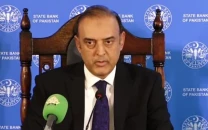Annual tax exemptions hit record Rs3.9tr
Economic Survey reveals 73% surge in tax losses, fuelling IMF dispute amid ongoing negotiations

The annual cost of tax losses due to various exemptions has surged to a record Rs3.9 trillion in the current fiscal year, a 73% increase from last year, becoming a contentious issue in ongoing negotiations between Pakistan and the International Monetary Fund (IMF).
The Economic Survey of Pakistan 2024, released by Finance Minister Muhammad Aurangzeb on Tuesday, revealed that despite multiple rounds of withdrawal of tax concessions and exemptions, the amount continues to rise annually. These tax exemptions, approved over the years, are protected under existing tax laws.
According to the survey, the Rs3.9 trillion worth of tax exemptions were 73% higher than in the previous fiscal year. Many of these exemptions were essential or in lieu of other taxes. For instance, the cost of the 18% sales tax exemption on petroleum products is Rs1.34 trillion, but the government has collected around Rs1 trillion through a Rs60 per litre petroleum levy.
The Pakistan Economic Survey 2023-24 showed that within one year, tax losses increased by Rs1.64 trillion. This increase occurred despite the government’s annual efforts to withdraw tax exemptions.
The Rs3.9 trillion in tax exemptions is equivalent to the cost of constructing two Mainline-I projects for Pakistan Railways, which span from the south to the north of the country. This figure also exceeds the Rs3.5 trillion development spending planned for the next fiscal year by both federal and provincial governments.
“Everyone will now have to pay the tax, and there will no longer be any protection to the holy cows,” said Minister of State for Finance Ali Pervaiz Malik.
The government aims to end the 1% fixed income tax regime for exporters to ensure they pay their fair share of taxes. However, influential exporters have approached the prime minister to block this move. The IMF has requested Pakistan to withdraw all exemptions except those under sovereign agreements or for export purposes. Negotiations continue over exemptions for fertilisers, pesticides, medicines, and essential food products.
Sources within the Pakistan Peoples Party (PPP) indicate resistance to withdrawing tax exemptions on agricultural inputs. Another round of discussions on Monday ended without resolution. The government claims Prime Minister Shehbaz Sharif does not support withdrawing these agricultural tax exemptions.
The finance minister did not respond to a question about how much of the Rs3.9 trillion in tax exemptions would be withdrawn in the upcoming budget, stating, “You will have to wait for my budget speech.”
Sales tax
Sales tax exemptions saw a 121% increase, growing from Rs1.3 trillion last fiscal year to Rs2.9 trillion this year. This Rs1.6 trillion jump is primarily due to exemptions on petroleum products. Sales tax losses accounted for 74% of the total tax losses this year.
During the outgoing fiscal year, the government maintained a 0% sales tax on petroleum products while charging a fixed levy of Rs60 per litre on petrol and diesel. The survey reported a loss of Rs1.34 trillion from sales tax exemptions on petroleum products, a 111% increase from the previous year.
Exemptions on products under the Fifth Schedule of the Sales Tax Act cost Rs206 billion, a significant increase from last year’s Rs140 billion. The Fifth Schedule relates to the zero-rated tax system. The IMF is now pushing for an 18% GST on these goods, including packaged milk.
Sales tax exemptions under the Sixth Schedule cost Rs676 billion this year, up by 73%, with Rs461 billion from local supplies and Rs215 billion from imported goods. Losses on local supplies surged by 250%, while those on imports decreased by 17%.
The government granted reduced sales tax on various goods, costing Rs358 billion this fiscal year, an increase of Rs228 billion or 175%. These exemptions, under the Eighth Schedule of the Sales Tax Act, allow for lower-than-standard 18% sales tax. The IMF is advocating for most of these rates to align with the standard rate, including on medicines, with exemptions costing Rs130 billion.
The country lost Rs33 billion from sales tax exemptions on mobile phone sales. An additional Rs208 billion in losses were reported from exemptions on additional sales tax.
Income tax
Income tax exemptions increased from Rs424 billion last fiscal year to Rs477 billion this year, making up 12% of the total tax exemptions. Exemptions on various allowances decreased by 60% to nearly Rs6 billion, following last year’s withdrawal of several income tax exemptions.
The government granted Rs24 billion in tax credits, Rs28 billion lower than the previous year. Exemptions on total income under the Second Schedule of the Income Tax Ordinance rose by Rs61 billion, or 26%, to Rs293 billion. The IMF is now targeting these exemptions.
Losses from reductions in tax liabilities amounted to Rs4.43 billion, lower than the previous year. Exemptions from “specific provisions” cost another Rs62 billion, also lower than last year.
Income tax exemptions availed by the government increased by 111% to Rs57 billion. These exemptions also benefited judges of superior courts, the President of Pakistan, military generals, federal bureaucrats, pensioners, and army institutions.
Customs duty
Customs duty exemptions cost Rs543 billion, up from Rs522 billion the previous year, a 4% increase. The government incurred Rs147 billion in losses from concessions given to the automobile sector, oil and gas exploration sector, and the China-Pakistan Economic Corridor (CPEC), Rs47 billion less than the previous year due to reduced imports.
Exemptions under the Fifth Schedule of the Customs Act, which covers goods exempted from customs duties, cost Rs191 billion, a Rs17 billion increase from last year. Import-related exemptions for exporters saw a dramatic rise from Rs31 billion to Rs127 billion, a 310% increase. Exemptions related to free trade agreements dropped from Rs103 billion to Rs44 billion due to lower imports



















COMMENTS
Comments are moderated and generally will be posted if they are on-topic and not abusive.
For more information, please see our Comments FAQ